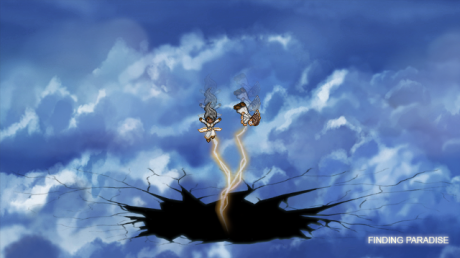Hibiscus is a flower of rare, delicate and elusive beauty. Its petals are extremely fragile, evanescent and with a very limited duration, ready to wither at the first stroke of time.
Like memories. Yet the memories of Colin Reeds, paradoxically, have as their common denominator the hibiscus: its colors and its scent hover among the sobs of the years, as if they were the only true constant of a life spent flying high, with ambitions and imagination.
It is Colin, an old aircraft pilot with a passion for cello, the new patient of the Sigmund Agency of Life Generation: Dr. Eva Rosalene and Dr. Neil Watts are ready, therefore, to fulfill his last wish, penetrating the mind to rewrite his past and his present, so as to deceive him of not having more regrets. A little ‘as they have already done, six years ago, with Johnny Wyles, the protagonist of the unforgettable To The Moon . This time, however, Colin is not enough “simply” to reach the moon …
Finding paradise release date
The only real thing about the entire trailer was the title “Finding Paradise” and the announcement that it would be released on Thursday, Dec. 14, for the PC, macOS and Linux.
Finding Paradise is the story of a journey back in time, in a continuous coming and going of fragments forgotten or set aside in the recesses of memory. For Kan “Reives” Gao was certainly a very difficult undertaking: to repeat,
With great awareness of their expressive tools, the author has decided to take a different path from that of pure emotion: where the story of Johnny and River pointed straight to the heart, up to clog our tear ducts, the story of Colin – at least initially – seems to stimulate more the cords of intellectual reflection.
When the two souls of Finding Paradise , the most touching and the most psychological, merge into a single embrace, the miracle is accomplished again: it will take only five hours to reach the conclusion of this magnificent adventure, but it will not suffice a whole lifetime to forget it.
“I’ll ask you to fly away with me”
Before Finding Paradise there was A Bird Story , a “short game” of just an hour that acts as a “trailblazer” to the story of Colin, telling us about his friendship, in childhood, with a small bird that has lovingly saved and cared for.
It is not an essential premise to fully enjoy the plot of Finding Paradise, but an addition that could, albeit to a lesser extent, help us to decipher some symbolism that underpin the narrative.
Once elderly, about to die, the protagonist is assailed by the desire to achieve a specific goal: what could a man like Colin want, who during his long life seems to have completed all the goals he had set for himself? In fact, his wife Sofia, whom he lovingly calls’ Fia, and his son Asher, whose name in Hebrew means ” happy “, ” blessed“, as if it were the final embodiment of his achievements and achievements, but the Sigmund agency is not called on by a whim of nothing: our beloved Rosalene and Watts will then dig deep into a rather complex looking for the true “dream” of Colin, in the
same way, while the two fearless investigators of the unconscious will probe the depths of his soul, Kan Gao will sneak up, little by little, into our brains and hearts, reserving another niche in that niche of memories where it already sits to the moon game .
Finding Paradise, however, does not touch the same “sentimental” strings of the previous work of Freebird Games, nor does it try, if not in the last moments of the narration: its intent is instead to stimulate a more “conceptual” reflection, asking the player to questioning the ethical legitimacy of the work of Eva and Neil, about the sense of abandonment and loneliness, about the meaning and essence of regrets, about childhood as the cradle of desires and about the future as a curtain of ambitions.
The writing of Kan Gao is, once again, light and powerful: a novel in pixel art with melancholy veins and intimate, which tackles, with astonishing delicacy, themes as unusual as penetrating.
Every tear is accompanied by a smile: the most intense dialogues and the most poignant moments are in fact lightened with touches of humor and citationism never so well contextualized, such as to allow Finding Paradise not to expire in pietism, in qualunquista rhetoric or in the logic of easy emotion. It’s the same magic as To The Moon , although its effect may appear – as it was unavoidable – less surprising and original, partly because of a plot twist that the most attentive players may perhaps find slightly predictable.
The great intuition of Kan Gao consists, in essence, in having proposed a sufficiently different experience and at the same time similar to that of his first masterpiece: a more direct story, with a less destabilizing impact, but not for this reason incapable of arousing equally pervasive emotions.
These are the styles of a writer who, in the play scene, knows few comparisons: the ability of his works to involve ourselves on the emotional and intellectual level is a feature that we would never change.


